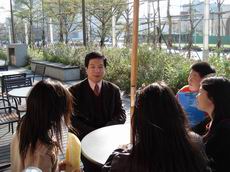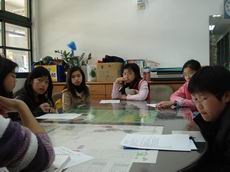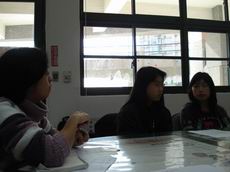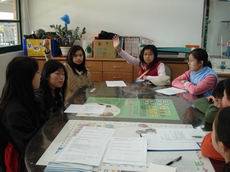|
|
|
|
 Interview-
Shin-Cheng Yeh , Dean of NKNU Graduate Institute of
Environmental Education, Interview-
Shin-Cheng Yeh , Dean of NKNU Graduate Institute of
Environmental Education, |
|
|
 Introduction Introduction |
|

■Interviewed
Subject: Shin-Cheng Yeh ,
Dean of NKNU Graduate
Institute of
Environmental
Education
■Date: 1/29/2007
3pm~4pm
■Location: Bin Jiang
Elementary School Community Café
■Interviewers:Regina,
Linda,
Wendy, Coco
■Photography: Jacky,
Henrry, Ruby,
Cindy
■Recordings:Amy,
Sandy,
Amada |
■English
Name: Shin-Cheng Yeh
■Sex: Male
■Education:
Cornell University School of Civil &
Environ. Engineering Ph.D
NTU School of Environ.
Engineering Masters
NTU School of Civil Engineering
Bachelors
■Occupation:
NKNU Graduate Institute of
Environmental Education, Dean
Center of Environment, Safety and
Health, Director
NKNU Graduate Institute of
Environmental Education, Associate
Professor
■Experience:
Cornell University, Visiting Scholar
NCNU Department of Civil
Engineering, Assistant Professor and
■Director of
Extracurricular Activities
NTU School of Environ.
Engineering Assistant Proffesor
NTU School of Environ.
Engineering Post Graduate Research
Taiwan
Business Council for Sustainable Development Project
Advisor
and Manual Author
|
|
|
 Pre-interview meeting Pre-interview meeting |
 |
|

|
 |
 |
|
Environmental Scouts
Interview Pre-meeting Photography by: Environmental
Scouts |
|
Date:
1/29/2007 1pm~2:50pm
Location: Bin
Jiang Elementary School Office
Subject: Professor Shin-Cheng, Yeh
Arranged time of I of interview:
1/29/2007 3pm~4pm
Participants:
Jacky,
Henrry,
Regina,
Linda,
Amy,
Wendy,
Ruby,
Sandy
,
Cindy,
Coco,
Amada
Equipment:
Camera, DV, Pen, Recorder, Water, Notebook, Records of
Interview
Topics of Discussion:
I.The questions we discussed last week
have been summarized here:
A.What subjects do you usually teach?
B.What started you on the subject of
global warming?
C.If the amount of greenhouse gases
continues to rise, what dangers might we see?
D.To let everyone understand this topic,
you've held an activity; can you tell us about it?
E.While you were promoting this activity,
what thoughts did u have, or what were some difficulties
you met?
F.To let everyone
understand this topic easily, you've written a book "What do we do about global warming?" Can you tell us
about the process of writing this book, and some of the
ways you did it?
G.Do you have
any special methods of accomplishing environmental
protection in everyday life?
H.Besides the above, what else can
elementary students do?
II. Work
Distribution: Our results were,
Regina,
Linda,
Wendy,
Coco take care of interviewing;
Amy,
Sandy,
Amada take care of recording and taking notes; Jacky,
Henrry,
Ruby,
Cindy
take
care of photography and other support.
III.
Getting Ready: After distributing t he jobs, we got the
equipment ready, and led Professor Yeh into his seat.
Jacky,
Henrry
decorated the site, Coco,
Amada
prepared drinks, and after the interview ended we gave
the professor a
Bin Jiang Elementary
School phone card to thank him for his guidance. |
|
|
 Summary
of Interview (The
contents were summarized by our scouts) Summary
of Interview (The
contents were summarized by our scouts) |
 |
|
■What
subjects do you usually teach?
The most important
subject is environmental science. Also, sciences in the
area of environmental science, like air, water, land,
resources, other related topics, and research on the
subject of sustainable development. |
|
■What
started you on the subject of global warming?
The main reason is that
Feb. 16th, 2005 was the day the Kyoto
Protocol was put into action. However, before this, many
scholars, experts, and people from environmental groups
were already concerned about this topic. Since I am also
in the environmental education area, I started on it
too. I also felt that in Taiwan, we need more people
like children and grownups to care about global warming
and global changes. A lot of people in the world care
about this problem, so I think we need to emphasize the
spread of this knowledge. |
|
■If the
amount of greenhouse gases continues to rise, what
dangers might we see?
Sea levels will rise, and
much more may happen, but most importantly the climate
will become abnormal, with extreme temperatures, and
ecosystems will change fundamentally. Animals and plants
will change, and new diseases may develop, so for the
whole ecosystem, there will be a fundamental effect.
What we can be sure of now is that many experts predict
polar bears to become extinct within the next few
decades, and other similar situations. |
|
■To let
everyone understand this topic, you've held some
activities; can you tell
us about it?
I've held many
activities, but the two important ones were: the Ford
Environmental Award- Cool Earth activity, which after
some elementary schools entered, I discovered that most
students were quite unfamiliar with this topic. However
the activity did successfully let the students and
teachers notice the importance of this topic, and also
attracted the media. I think it had important
promotional meaning. The second activity was held in
Taipei City- the webpage design contest and essay
contest on reduction of greenhouse gases. Taipei City
should be the part of the country with the most children
that care about this topic. They were actually quite
creative, and what they knew about the greenhouse effect
was pretty interesting. I think we should hold more
activities like this, and let more children join and
understand this topic. |
|
■While
you were promoting this activity, what thoughts did u
have, or what were some difficulties you met?
The most difficult thing
was, Taiwan's focus on this topic isn't enough, so
sometimes we needed to use a lot of time to explain to
people what was going on. However, I think that under
normal circumstances everyone should know about it. The
other difficulty was that students and teachers are very
busy, so sometimes the children don't have time to join
our activities. These activities become extra burdens
for students. The thing I remember the most is, we met a
difficulty. We held the activity with the EPA, and they
sent official documents to every elementary school, but
most schools didn't really pay attention to the
documents, because they weren't from the Ministry of
Education. We really wanted to hold a meaningful
activity, and this was a problem. |
|
■To let
everyone understand this topic easily, you've written a
book "What do we do about global warming?" Can you tell
us about the process of writing this book, and some of
the ways you did it?
This book was written
because the Kaoshiung City government invited me to do
an experiment, and we collected a lot of information. I
did this with some of my students. In the course of
writing this book I noticed that Taiwan's research and
devotion to this subject was in fact very limited. We
had to take most of the information from foreign sites.
This was a very important realization for me. Because we
had set the books reader level for elementary of junior
high school students, we used lively ways to write it.
This was also because my students were younger, so their
creativity was useful. It was actually quite a
pleasurable experience. |
|
■Do you
have any special methods of accomplishing environmental
protection in everyday life?
I don't think that there
are any special methods or ways, but more importantly,
it's a basic attitude. With the right attitude you will
know what to do when the time comes. Live simpler. With
the correct attitude, you will think before you buy
something, before you eat a big meal. Letting things
become simpler is the right way. |
|
■Besides the above, what else can elementary students do?
Elementary students can
do a lot; buy less clothing, eat simpler, turn off the
lights, avoid buying unnecessary things. |
|
|
 Tidbits
of the Interview Tidbits
of the Interview |
 |
|
|
|
|
|
 |
|
|
